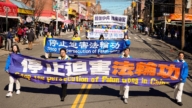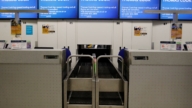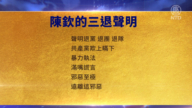【新唐人2013年10月25日訊】中共18屆三中全會即將上演,中共最高領導層自述當前的改革問題,都是難啃的硬骨頭,因此向中外專家和智囊討求所謂「改革良藥」。那麼,中國真正的問題出在哪裏?中共內部的所謂改革還能奏效嗎?
中共11月就要上演的三中全會,至今還沒有公布開會日期。不過幾個月來,中共高層在多種場合,特別是國際會議上,都在主動談及中共要全面深化改革。
10月23號,中共國家主席習近平會見了海外智囊團,就中共即將定讞的經濟改革向他們「求醫問藥」,智囊團中包括世界最大的私人股權公司—-「凱雷集團」董事、總經理大衛•魯賓斯坦(David M.Rubenstein),和「華盛頓布魯金斯研究院」理事會主席—約翰•桑頓(John Thornton)等。
習近平當天在釣魚臺國賓館,會見「清華大學經濟管理學院顧問委員會」海外委員時,再次強調,中共本屆三中全會,將研究全面深化改革問題。
習近平自述,當前改革需要解決的問題格外艱鉅,都是難啃的硬骨頭。瞻前顧後,畏葸不前,不僅不能前進,而且可能前功盡棄。
美國南卡羅萊納大學艾肯商學院教授謝田:「每次中共在危機的關頭,在幾乎崩潰滅亡的關頭,總是會拋出來各種各樣的煙幕彈,說他們又要改革了,又要反腐了,又要政治改革了,中共的本質從來就沒有改變過,所有這些所謂的改革,或者聽取別人的意見,或者聽取智囊團的建議,目地只有一個,就是為了繼續維護和鞏固中共的統治。」
中共歷史上,自1978年鄧小平啟動了第一次所謂改革後,還進行了幾次經濟改革,不過這些改革往往在中共處於執政危機後出現。
促成第一次改革的危機,是「文化大革命」導致中國經濟處於毀滅的邊緣,直接威脅到共產黨的執政,不得不實行以家庭聯產承包的責任制。
第二次改革,始於1989年「六四事件」後,國際上一片制裁之聲,同時,蘇聯等東歐「共產國際」全面崩潰,中共再次面臨生存危機,鄧小平被迫「南巡講話」,開始跛足改革。
到了1998年,2/3以上國有企業虧損,中共的經濟命脈面臨衰亡,中共開始所謂的國有企業重組,工人開始下崗,大量國有資產落入共產黨領導人的私人腰包,造成目前社會貧富兩極分化嚴重。
那麼,中共現在進入的所謂「改革深水區」,面臨了甚麼危機?
旅美原大陸史學教授劉因全:「中國目前面臨的危機是全面危機,從思想文化上、經濟上、政治上、環保方面,中共面臨一個全面危機爆發的前夜的這麼一個階段,在這種情況下他們非常的不安。」
台灣大學經濟系教授張清溪:「現在(中共)遭遇到很多的困難,包括拆遷造成社會的民怨,很多特權造成分配非常懸殊,污染非常嚴重,地方債務問題,金融問題非常嚴重,這種事情都是因為政府主導,必須要由政府主導變成市場主導,但是因為它政治沒有改變,這種東西是不可能成功的。」
日前,中共國務院總理李克強出席中共工會全國代表大會時,在報告中,他承認當前中國經濟運行面臨一系列的困境。他表示,今年前兩個季度,經濟增速持續放緩,消費、投資以及外貿全面呈現下行趨勢,中央財政收入出現負增長。
國內經濟學家吳敬璉指出,只完成一半的改革是當前經濟所面臨的問題的根源。必須實施政治體制改革,才能使增長步入可持續軌道。
中國金融智庫研究員鞏勝利:「習近平在政治改革上比胡溫時期還要往後走,在經濟改革,因為限於全球經濟環境發生的變化,他又不得不往前推,一退一推兩個的矛盾顯而易見,如果沒有政治開放的話,這些經濟開放已經走到了極限。」
目前中國各種維權抗暴運動風起雲湧,民眾退出中共的「三退」大潮,再再凸顯中共面臨的執政危機。
新唐人記者劉惠採訪報導
Xi Jinping Consults Overseas Think Tank
The Chinese Communist Party’s (CCP)
Third Plenary Session will be held soon.
The top leadership say the current reform like
biting on hard bones, is very tough.
They consulted experts from home and abroad.
What is the real direction for China?
Will the CCP internal reforms work?
Let’s take a look.
The Third Plenary Session was scheduled in November.
The date has not been publicized yet.
For several months, the high-level leaders spoke on many
occasions, particularly at international meetings.
They vowed to fully deepen the reforms.
On Oct. 23, the CCP leader Xi Jinping met
with an overseas think tank.
Xi consulted experts about China’s economic reform.
The experts include David Rubenstein, co-founder of the
Carlyle Group, a global private equity investment firm,
and John Thornton, Chairman of the Board of Trustees at
Brookings Institution in Washington D.C..
On the same day, Xi met with overseas members of
Tsinghua University School of Economics and
Management Committee in Diaoyutai State Guesthouse.
Xi emphasized the upcoming CCP conference will discuss
deepening reforms.
Xi says the current problem of reform needs to be resolved
is extremely tough, which like hard bones is hard to bite.
If they hesitate and are timid, not only can the CCP not
leap forward, but it will also ruin previous achievements.
Xie Tian, Professor at Aiken Business School, University
of South Carolina: “Each time the CCP faces crisis,
it always uses various means such as reform,
anti-corruption, political reform to escape the collaspe.
The CCP’s evil nature has never changed.
All the so-called reforms or listening to other opinions or
consulting think tanks, is for one purpose.
That is to continue to maintain and strength its rule."
In the CCP history, since Deng Xiaoping initiated
reform in 1978, several economic reforms were carried out.
These reforms appeared while the CCP faced political crisis.
The Cultural Revolution has caused the economy to
almost collapse, so the first reform took place.
The crisis directly threatened the CCP’s survival, so the
CCP launched household responsibility system at that time.
The second reform happened after Tiananmen Students
Protest in 1989, when the CCP faced the international sanctions.
Meanwhile, the Soviet Union and East European
Communist Party totally collapsed.
The CCP again encountered crisis of survival.
Deng Xiaoping had to launch “Southern Tour Speeches"
to implement the reform.
In 1998, two-third of state-owned companies
faced financial loss.
The CCP economy faces collapse. So the CCP restructured
state-owned companies.
Many workers were laid off, many state-owned assets
were seized by CCP leaders.
It seriously widened the gap of wealth.
What is the crisis that makes CCP vow to
deepen the reform?
Liu Yinquan, US-based Professor in Chinese history:
“China is facing complete crisis.
In areas like cultural, economy, political, and environmental,
the CCP is at the time before the entire crisis breaks out.
So the CCP panics."
Zhang Qingxi, Professor in Economics in Taiwan:
“The CCP is facing many problems.
It includes demolition causing resentment.
Many privileges caused poor income distribution.
Severe pollution and local government debts problems,
the financial problems are serious.
All caused by the government.
The central regime is in-led, then led by the local regime.
It didn’t change politically, thus it bound not to be successful."
Recently, the CCP Premier Li Keqiang attended the
national workers unions meeting.
Li admitted in his report that China’s economy is
facing a serious difficulty.
In the first two quarters, economic growth
continues to slow down.
Consumption, investment and
foreign trade are declining.
The central fiscal revenue showed
negative growth.
Chinese economist Wu Jinglian says that the reform is half
done which is the cause of current economic problems.
Only to carry out political reform, can the economic growth
on a sustainable track be achieved.
Gong Shengli, researcher at a Chinese financial think-tank:
“Regarding political reform, Xi Jinping went more backwards
than the Hu Jintao and Wen Jiabao era.
Regarding economic reform, its forced by the global economic
environment changes, Xi has to go ahead.
The two have obvious contradictions.
China didn’t open up political reform, but the economic reform
opening up has reached its limit."
Now in China, many protests occur one after another.
People quit the CCP and its affiliated organizations shows
the CCP is facing crisis of legitimacy.






























